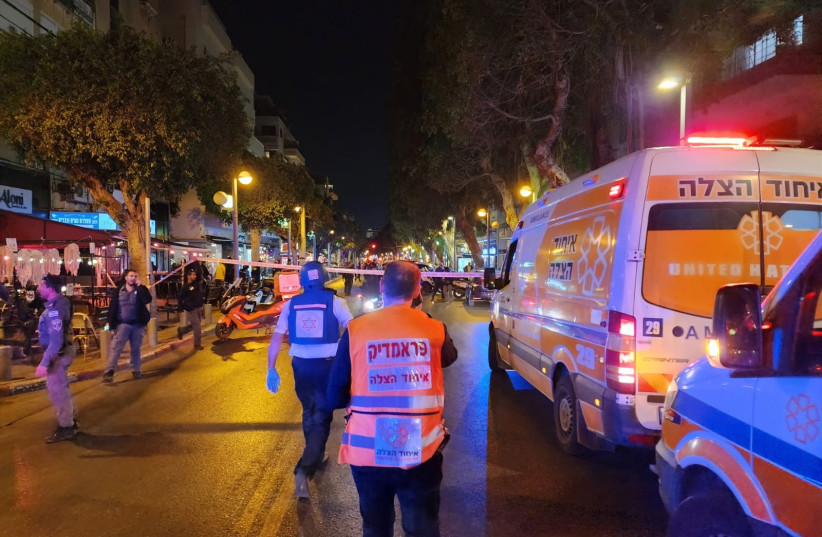Israelis are angry and divided. They’re yelling at each other and staging furious demonstrations. Accusations and name-calling abound. But once again, Palestinian Arab terrorists have reminded us that at the end of the day, what Israelis have in common is more important than the disagreements over this or that policy proposal.
On Thursday evening, a Palestinian Arab terrorist walked up to a cafe in Tel Aviv and started shooting. He wasn’t shooting at soldiers or “settlers.” He was trying to massacre unarmed Israeli civilians sitting at an upscale cafe in the heart of secular, politically left-wing Tel Aviv.
That same evening, 72 km. away, another Palestinian Arab terrorist was trying to massacre Israeli civilians. He boarded a bus in the Orthodox (haredi) town of Beitar Illit, near Jerusalem, and planted a bomb. Smoke began to come from the bomb but, in one of those countless miracles that Israelis experience every day, the device did not immediately detonate. That gave bomb disposal experts the crucial minutes they needed to neutralize it.
If the would-be murderer in Tel Aviv had sharper aim, countless secular Israelis would have been slaughtered. If the would-be murderer in Beitar Illit had more expertise in bomb construction, countless Orthodox Israelis would have been slaughtered.
Consider, for a moment, how vastly different those two segments of Israeli society are: What they wear. What they eat. How many children they have. The books they read. The movies they watch (or don’t watch). Where they go on vacation. What they do on Shabbat. By these measures, secular Israeli Jews and Orthodox Israeli Jews are as different as night and day.

But Palestinian Arab terrorists couldn’t care less about those differences. Like other violent enemies of the Jewish people throughout history, they never try to kill only a certain type of Jew. They don’t care if an Israeli Jew is more religious or less religious. They don’t care if he or she lives in Tel Aviv or in a hilltop outpost.
The automatic weapons that the terrorists shoot, the bombs they plant, the rocks they throw, the knives with which they stab, are aimed at all Jews.
Life and death: The most important thing united Israelis together
That’s why, despite all the overheated social and political controversies that consume the country these days, Israelis remain remarkably united on the most important issue of all: life and death.
On the need to take strong action against Palestinian Arab terrorism, there is a wall-to-wall, Right-to-Left consensus. On this crucial topic, there is a degree of unity that is difficult to find in any other country, including the US.
CONSIDER HOW members of Knesset voted on the recent legislation authorizing the deportation of convicted terrorists who are receiving financial subsidies from the Palestinian Authority.
The New York Times described the bill as “harsh,” “hardline,” and the product of a “far-right” government. In fact, the new legislation represents the centrist, not right-wing, position in Israel today. It passed by an astonishing margin of 94 to 10.
The supporters included the major left-of-center opposition parties, Yair Lapid’s Yesh Atid and Benny Gantz’s National Unity.
MKs from the left-wing Labor Party were absent from the vote, but not because they opposed the bill. “We supported the bill when it was first proposed,” a Labor spokesman explained. But they decided to absent themselves from the voting as a protest against some of the government’s domestic policies.
Consider, too, the widespread public support for the Israeli army’s “Operation Break the Wave,” the strategy of sending the security forces into Palestinian Authority-governed cities in hot pursuit of terrorists. After the wave of Palestinian Arab shootings, bombings, and stabbings that left 19 Israelis dead in early 2022, the left-of-center government headed by Naftali Bennett launched the operation. Bennett’s successor, Yair Lapid, continued the action – with the support of his left-wing allies, Labor and Meretz, because chasing terrorists has never been a “right-wing” or “left-wing” position.
An Israeli military spokesman said recently that in the first eight months of Operation Break the Wave (from March to November 2022), the security forces “thwarted some 500 terror attacks.” They captured “at least 250 weapons” and “$785,000 in cash” that was to be used to finance terrorist attacks. And more than 2,500 terrorists were arrested.
The only critics of the army’s operation are the champions of the Palestinian cause who are prominent in academia, the media, and extremist advocacy groups. They don’t like Operation Break the Wave because their side is losing.
It may be distressing to see Israelis arguing so vehemently about differences in domestic policy. But it’s heartening to remember that when it comes to the issue that counts the most – stamping out terrorism and ensuring the survival of the Jewish state – Israel’s national consensus is holding strong. It shouldn’t take Palestinian Arab terrorist attacks in Tel Aviv and Beitar Illit to remind us of the ties that bind.
The writer is an attorney and the father of Alisa Flatow, who was murdered in an Iranian-sponsored Palestinian terrorist attack in 1995. He is the author of A Father’s Story: My Fight for Justice Against Iranian Terror, and is an oleh chadash (new immigrant).
